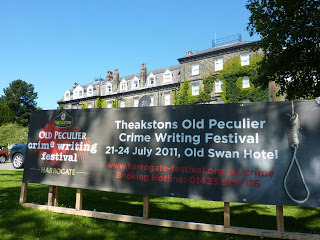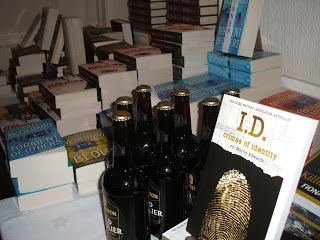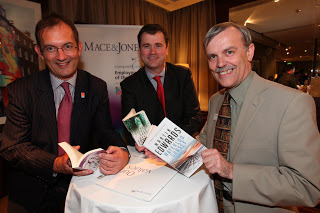Martin Edwards's Blog, page 262
July 25, 2011
Panels

Crime festivals like Harrogate succeed or fail to a large extent through the quality of their panels and main events. But of course, quality is not entirely dependent on the fame of the panellists (and thank goodness for that!) Much depends on how the different people involved gell together.
I did feel that our 'legal eagles' panel was one where the different personalities clicked together. A good moderator like Peter McCormick helps. Another example was a panel called 'What Lies Beneath', on psychological crime fiction. The moderator was N.J. Cooper, a fine writer who is also supremely accomplished at putting people at their ease and creating a feelgood factor.
A different situation occurred when the moderator of a conversation between the American thriller writers Linwood Barclay and Lisa Gardner clearly found the task of public speaking a bit of a challenge. A tricky situation that anyone can sympathise with - it took me years to feel comfortable with speaking in public, so my heart went out to the person involved - and one that was happily redeemed by the evident good chemistry between the two authors. I've never read a Linwood Barclay book, but his wit and genial manner made me interested in his work.
Which leads me to another point. You can like a person and not necessarily like their books. But it's true, I think, that if one comes across a previously unfamiliar author at a convention and finds them personally appealing, one is more tempted to read their books. It may not be logical, but I think it happens a lot.
July 24, 2011
Harrogate and Legal Eagles
I got back home this afternoon after a truly exhilarating time at the Theakston's Old Peculier Crime Writing Festival at Harrogate. It was great to catch up with old friends and also to meet some nice people for the very first time.
This was the very first time I've been asked to be on a panel at Harrogate. The title was 'Legal Eagles' and it proved to be a real treat. This was due in no small measure to the fact that it was very well moderated by an eminent Yorkshire lawyer, Peter McCormick. I've known of him for many years, but we'd never met before.
My fellow panel members were a delightfully diverse group. The brilliant Frances Fyfield is someone I've been lucky enough to know for a long time, but M.R. Hall is a barrister turned novelist I've met more recently, having twice shared a platform with him at Crimefest. Helen Black, a solicitor whose work has been compared to Martina Cole's, is a friend of a friend whom I'd only met very fleetingly in the past.
It was a really enjoyable session, and the hour flew by. The feedback from audience members was great, and I felt thrilled to be speaking at the hotel most famous as the place where Agatha Christie hid during her disappearance in 1926. Quite a place, quite a weekend.
July 22, 2011
My first bad review
I'm glad my post about reviews on Wednesday attracted quite a lot of interest. As a reviewer, as well as a writer, I'm all too well aware of the sensitivities of the subject - and its importance to those concerned.
I thought I'd tell you the story of my first bad review, back in 1991. Of course, I was excited by the appearance of my first book, All the Lonely People. It featured a Liverpool lawyer, Harry Devlin, and was the first in a series of (so far!) eight books.
The early reviews were great. Then I read one in a magazine for law students. It began well, by immediately comparing my book to Raymond Chandler. I was pleased, though surprised, as it really bore no resemblance to the work of the great private eye writer.
Then, as I read on, it emerged that the reviewer really didn't like Raymond Chandler. Nor did she like poor old Harry. And she didn't like my book, either. Indeed, she went on to make it clear she didn't have any time for crime fiction in any shape or form.
I remain unclear as to why she bothered to write the review, but I do know the magazine soon became defunct and of course I really didn't mourn it! Anyway, my book was later shortlisted for the award for best crime debut of the year. So perhaps, whatever its faults, it wasn't too terrible after all.
But the incident has stayed with me as an encouraging example of why one shouldn't get too despondent about reviews, however unkind or indeed unfair. And there is one golden rule, I think, for authors. It's a mistake to argue with reviewers who don't like your book. You have to chalk it up to experience. Not a happy experience, sure, and like any other writer, I love having my books positively reviewed. But there are much worse things in life than bad reviews. Besides, just occasionally, a bad review says more about the reviewer than about the book.
Literary Agents
I'm often asked about literary agents – usually by unpublished writers seeking recommendations, but sometimes by very experienced writers whose relationship with their own agent has run into trouble. So here are a few very subjective thoughts based on my own experience.
For a new writer, I think it's highly desirable to have a decent agent batting on your side. Without this support, it really is an uphill struggle. Not an impossible struggle, but very, very difficult. Publishers take agented submissions much more seriously. It doesn't matter whether they are right or wrong to do so; it is the reality, with few exceptions.
For any writer, losing the editor who took you on to their list can be traumatic. It has happened to me more than once. But losing or falling out with your agent is even worse, and I know a number of authors who have found this a very traumatic experience. If at all possible, it is a good plan to find someone whom you can trust and who is on your wavelength – and stick with them.
I've been lucky with my own agent, Mandy Little. She took me on when I'd never published any fiction, at the end of the 1980s, and we've been together ever since. I have always had the feeling that she believes in me as a writer, and though I haven't made her rich with commission – far from it – she continues to have faith that one day there will be a breakthrough. You never know!
July 21, 2011
Forgotten Book - Death to the Rescue
I've told the story already of how Milward Kennedy was sued for libel over his 1931 novel Death to the Rescue, but I've chosen the novel as today's Forgotten Book because I found his dedication to Anthony Berkeley very interesting. Here it is:
'"We have sometimes discussed the future of the Detective Novel. We know only too well ourselves-imposed difficulties; our oaths to play fair, to conceal from the reader no clue of which are detective is aware, to eschew Death Rays and Unknown Poisons and over-use of Chinamen. We know, too, our other difficulty – the character of our Detective.
Our public grows sophisticated… It knows that in the investigation there is no place for the talented amateur or the private practitioner… So we are driven to make him a Priest, or Insurance Agent, or Lawyer, or Journalist… These professions grow overcrowded. Worst of all, we make him a policeman – super-eccentric or super-efficient, which ever seems more likely to add a taste piquant enough to hide the smell of machinery. We aim at even greater ingenuity in the ways of murder…
You, I believe, discern a new road – the "inner history" of the murder itself. You and Miss Sayers and others have given us masterly glimpses of that new road. But – will it not lead you away from Detection?
Here is a novel of Detection and little more; with a Detective who is wholly amateur, and has no knowledge of Shellfish or Finger-Prints or Cigar Ash; with no excitement of chase or of lunacy or of the shadow of the gallows spreading across the path of the innocent…
But, since I am the author, the novel does not answer the question, 'can Detection in itself be the whole motive of a Story?" I suggest that you can write a novel which will prove that the answer is 'yes'.'
I rather like the idea of writers setting each other challenges like this. It doesn't happen today in the same way. Sure enough, Berkeley responded with a book dedicated to Kennedy three years later. But he didn't exactly take up the challenge...
July 20, 2011
Harrogate

Today I set off for the Theakston's Old Peculier Crime Writing Festival at Harrogate. For the first time I've been invited to be on a panel, 'Legal Eagles', on Saturday. My fellow panellists include the marvellous Frances Fyfield.
I've been involved with Harrogate in various ways over the years. Hosting a table at a murder mystery dinner, for instance, and giving a talk at the Creative Thursday workshop to would-be writers. It's always a very well organised weekend and for that Sharon Canavar, Erica James and their team take great credit.
One highlight was when The Coffin Trail was shortlisted for the best crime novel award, and I was up against Ian Rankin, Val McDermid (who won), Stephen Booth, and Susan Hill. It was certainly one of the highlights of my career, even though I do think I've written quite a few better books both before and since The Coffin Trail!
And another good occasion was the launch four years ago of the CWA anthology I.D. at an event at the Pump Rooms. Note the pints of Theakstons strategically displayed on the book table!
July 19, 2011
Awaiting Reviews
The imminent publication of The Hanging Wood means that, like any author, my mind is turning to the possibility of review coverage. I say 'possibility' because the days when review coverage was a given have gone - at least so far as newspaper reviews are concerned. My early books regularly received attention from national newspapers such as 'The Times' and 'The Guardian', but the reviewers of the 90s have largely left the stage. An example is the late Matthew Coady, a delightful man who combined political reporting with crime reviewing and who was very good to me and my early Harry Devlin books.
I was very, very lucky with The Serpent Pool to receive good national press coverage, but a number of reviewers have told me that it's hard to persuade editors to allow space to cover mid-list writers like me. I don't believe that's an excuse on their part; I'm sure it's the reality, galling as it is. (Matthew Coady once told me that one of his reviews of my work was spiked for lack of space, and that wasn't the last time this has happened. Frustrating, but that's life.)
Fortunately, the world has moved on, and now the blogosphere provides a good many writers, including (so far!) me, with extensive review coverage. Amazon reviews, too, become more important with every year that passes. And with this book, I'm in the curious position of having had it published first in the US, so that I've had the pleasure of getting some very positive reaction from both the press and bloggers already.
Do reviews matter? After all, I've done well in terms of reviews for a long time, and never really made a massive breakthrough - though I have kept going happily! But yes, I do think reviews matter, and for a range of reasons.
Good reviews are obviously great for morale. Bad reviews need to be considered with care - I pay more attention to criticism from someone who would normally be a fan of my work than from someone who doesn't really get what I'm trying to do, and many other writers have a similar attitude. I do think, though, that you have to be a bit fatalistic with reviews. You can't control what people think, or say. All you can do is your best, and try to fulfil your personal contract with your readers.
July 18, 2011
Andrew Taylor
I've mentioned Andrew Taylor and his books several times in this blog. I was reading his crime novels long before I met him – he started his career young, and began with a series featuring the amoral William Dougal that is often described as 'quirky'. It's almost a cliché, but it's still a fair description, because the Dougal books are definitely unusual and different. One of my favourites is The Sleeping Policeman.
As a full-time writer, Andrew has turned his hand to many kinds of projects. He even produced five novels based on the Bergerac TV series, under a pen-name, Andrew Saville. Every now and then he has turned out a stand-alone psychological suspense novel, and my favourite of these is The Barred Window – really good.
His next series was set in the 50s in the fictional Border town of Lydmouth. It features the relationship between a married cop and a female journalist – one book, cleverly, focuses on the story of the cop's wife. This series began quietly, but the later books are exceptional. I've written an article about Thornhill, the cop, which Andrew included on his website, and I mean to update it some day.
The Roth Trilogy is, arguably, his masterpiece. I've written about it before on this blog. Suffice to say that it's one of the most impressive trilogies I've come across in crime fiction – a study, going back through time, of the making of a sociopathic killer.
Then there are his historical novels. The American Boy is the best-known, and I reviewed The Anatomy of Ghosts recently. It's shortlisted for the Harrogate Festival award this week and I'm keeping my fingers crossed for him.
I'd particularly mention Bleeding Heart Square, which is superbly done. He always conveys the atmosphere of the period, and the setting, splendidly, and Bleeding Heart Square has a very good plot and also some resonances with present day Britain. A very good writer, whose work is varied and highly literate. If you don't know his work, do give it a try.
July 17, 2011
Book Launches




Book launches are great fun for an author, but are they really worth doing? I've heard varying opinions on the issue - just as views differ as to the value of book signings. I've been to plenty of launches by other authors, as well as having a few of my own, and I've enjoyed them. Maybe the key question, though, is: what do you expect to get out of them?
For writers like me who do not sell in vast quantities, realistically, part of the rationale for a book launch is simply to have a good time in the company of like-minded people. Selling books is a bonus, not the main purpose. For bestsellers, of course, it's different, mainly a commercial enterprise. But a launch which focuses just on selling isn't terribly attractive in my opinion.
An unexpected benefit of my last launch, of The Serpent Pool, at Gladstone's Library, was that the setting gave me an idea for part of my next book. So it's very fitting that The Hanging Wood will again be launched at Gladstone's Library, on 28 July. I'm really looking forward to it.
Having a distinctive venue for a launch seems to me to be part of the fun of it all. I've been lucky in this respect. In the past, my launches have taken place at such terrific locations as Manchester Central Library (M.O., the CWA anthology), The Hard Day's Night in Liverpool (Waterloo Sunset) and St George's Hall in the city (Dancing for the Hangman.) Nights to remember and I'm optimistic that 28 July will be equally memorable.
Case Histories, Kate Atkinson and True Crime
The Hanging Wood is due to be published in the UK later this month, and I'm planning to go back to a daily blog post for the next fortnight, as if to celebrate! I'm also looking forward to my first panel at the Harrogate Festival - where I hope to see some of you - and the book launch at Gladstone's Library.
Meanwhile, I just watched the final two episodes of the (in my opinion) enjoyable Case Histories starring the excellent Jason Isaacs as Jackson Brodie. The changes to Kate Atkinson's book, When will there be good news? were many, but I thought it still worked pretty well.
The story seems clearly to have derived in part from the terrible case of Lin, Megan and Josie Russell, though I've seen some reports where Atkinson says she got the idea from another attack on a woman in a park. Whatever, she makes brilliant use of the concept of a girl who is a true survivor, and this came through in the TV version.
It did make me wonder, though. What other crime novels of the past 20 years have been based on or influenced by real life crimes?



